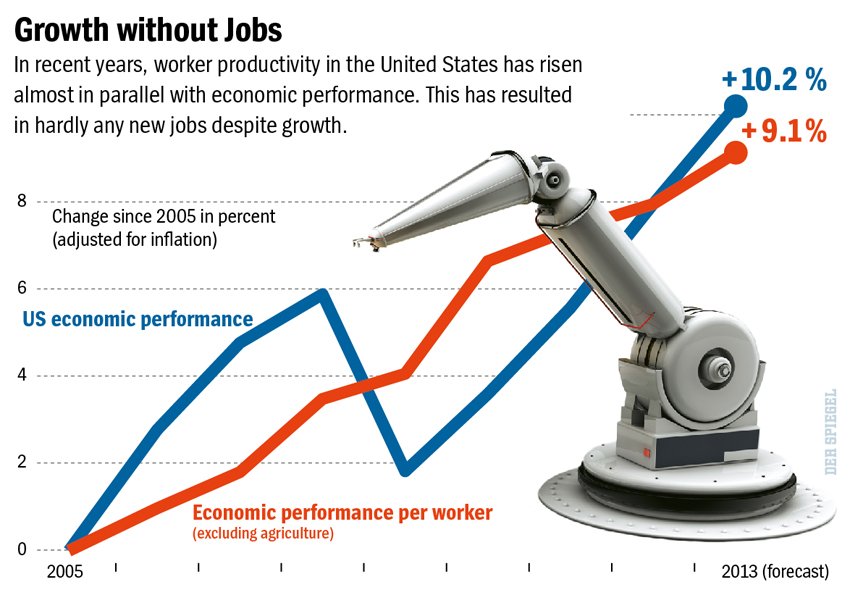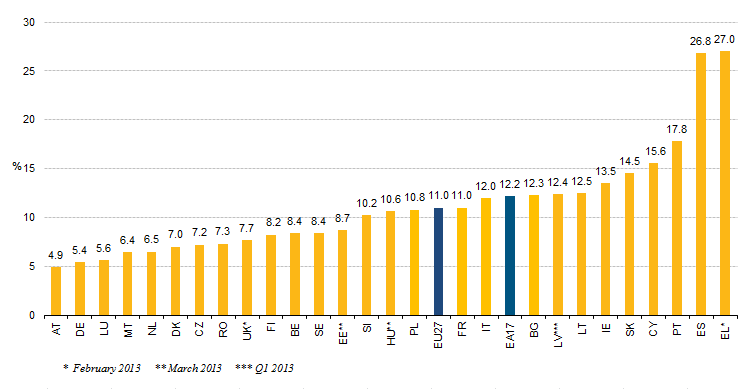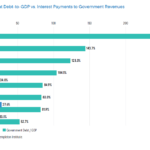Technological advancements made possible by computer is destroying jobs faster than creating them according to a study by economists Andrew McAfee and Erik Brynjolfsso of MIT. Many scholars are now warning that this revolution is different unlike past warnings of destruction of jobs due to technological innovations that have proved exaggerated.
From Man vs. Machine: Are Any Jobs Safe from Innovation? by Thomas Schultz in Der Spiegel:
The worldwide application of computer technology has become so much more cost-effective and efficient that people are no longer only replaceable in certain sectors — autoworkers on assembly lines, for instance — but in entire occupational areas. Cashiers are being replaced by self-service check-out lines, airline employees by self check-in kiosks, financial traders by algorithms and travel agencies by online travel sites.
This development has been apparent for roughly a decade. But, says McAfee: “You ain’t seen nothing yet. Looking ahead to what technology is going to do over the next five to 10 years, I’m really concerned.”
In addition to the ongoing turmoil from the financial crisis, Western economies may have to face “tectonic shifts in employment,” the economists warn — and Asian countries won’t be able to escape this development, either. In the battle between man and machine, many workers in Chinese production plants will also lose out.
Fresh Causes for Concern
Fears of the impact of technical progress are nothing new. Back in 1930, renowned British economist John Maynard Keynes warned of a “new disease” that he dubbed “technological unemployment.” Nonetheless, the world’s economies and their labor markets have always managed to swiftly adapt to even major changes and, ultimately, more jobs were created in new industries than were lost in obsolete ones.
Why should this be any different for the digital revolution, which has produced global technology giants, such as Microsoft and Google, over the past couple of decades and created countless new jobs around the world?
It goes without saying that advances in computer technology have generated millions of new jobs around the globe, more than any other economic sector, says McAfee. But he hastens to add that, at the same time, this very progress could wipe out even more jobs in other areas of the economy.
The two MIT professors are not the only ones issuing such warnings. Politicians and economists of all ideological stripes have similar concerns, and current unemployment figures from early April appear to confirm these fears. Despite the current positive economic climate and rising consumer confidence, far fewer jobs have been created than expected.
“Can innovation and progress really hurt large numbers of workers, maybe even workers in general?” asked Nobel laureate and economist Paul Krugman, for example, in his column for the New York Times last December. “I often encounter assertions that this can’t happen,” Krugman wrote. “But the truth is that it can.”
The 2000s were the first decade since the Great Depression to end with a net loss in jobs despite the fact that per capita gross domestic product (GDP) in the US is one-third higher than it was 20 years ago — and the country produces 75 percent more goods than it did back then.
Automation is decimating jobs in developed economies. When outsourcing and offshoring of jobs are taken into account jobs are scarce in most of the developed world especially in the Eurozone countries. The chart below shows the latest seasonally-adjusted unemployment rates in the EU:
Click to enlarge
Source: Eurostat
In Spain and Greece the unemployment rate now stands at over 25%. In the U.S. such high rates were last seen during the Great Depression. Countries such as France, Italy, Ireland and Portugal have unemployment rates in excess of 11%. In many European countries the rate for youth is much higher.
In the U.S, the unemployment rate stood at 7.5% in April down from 7.6 % in March. The employment situation has considerably improved from April 2012 when the rate was 8.1%. According to official figures, the total number of unemployed Americans was 11.7 million in April. The real numbers are much higher.
Unless policy makers implement effective policies to reinvigorate the job market, high unemployment rates will be the “new normal” in advanced countries for years to come.





